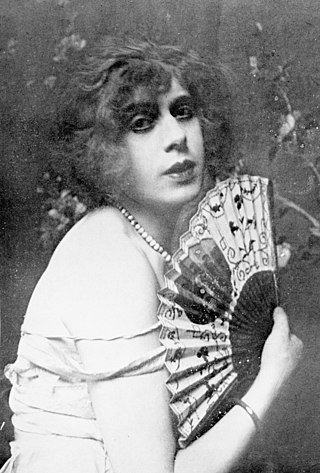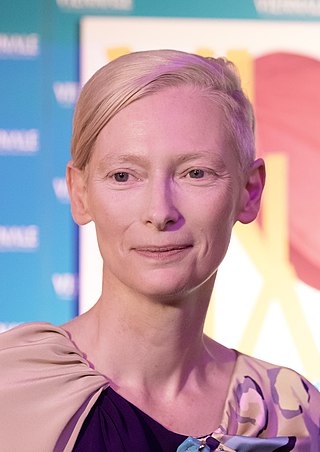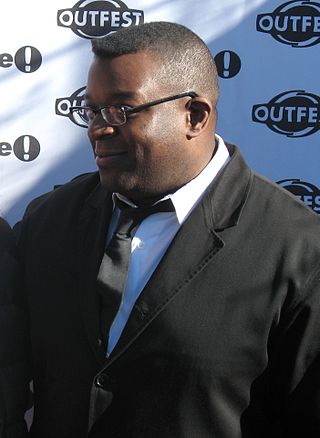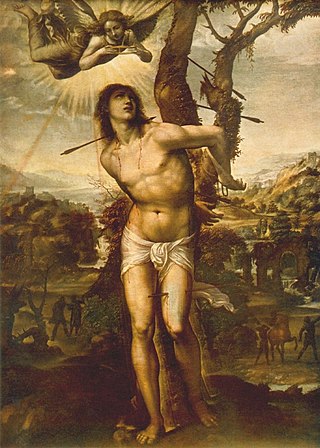
Bridget Louise Riley is an English painter known for her op art paintings. She lives and works in London, Cornwall and the Vaucluse in France.

Lili Ilse Elvenes, better known as Lili Elbe, was a Danish painter, transgender woman, and one of the earliest recipients of sex reassignment surgery.

Katherine Matilda Swinton is a British actress. Known for her roles in independent films and blockbusters, she has received various accolades, including an Academy Award and a British Academy Film Award, in addition to nominations for three Golden Globe Awards. In 2020, The New York Times ranked her as one of the greatest actors of the 21st century.

A gay anthem is a popular song that has become widely popular among, or has become identified with, the gay community. Not all songs labelled as "gay anthems" were written intentionally to become gay anthems, but those that do are often marked by themes of perseverance, inner strength, acceptance, pride, and unity. Research in 2007 suggested that the song most commonly identified as a gay anthem is "I Will Survive" by Gloria Gaynor, and described the song as "a classic emblem of gay culture in the post-Stonewall and AIDS eras".

Sir Isaac Julien is a British installation artist, filmmaker, and Distinguished Professor of the Arts at the University of California, Santa Cruz.

Dame Ethel Walker was a Scottish painter of portraits, flower-pieces, sea-pieces and decorative compositions. From 1936, Walker was a member of The London Group. Her work displays the influence of Impressionism, Puvis de Chavannes, Gauguin and Asian art. Walker achieved considerable success throughout her career, becoming the first female member elected to the New English Art Club in 1900. Walker's works were exhibited widely during her lifetime, at the Royal Academy, the Royal Society of Arts and at the Lefevre Gallery. She represented Britain at the Venice Biennale four times, in 1922, 1924, 1928 and 1930. Although Walker proclaimed that 'there is no such thing as a woman artist. There are only two kinds of artist — bad and good', she was elected Honorary President of the Women's International Art Club in 1932. Soon after her death, she was the subject of a major retrospective at the Tate in 1951 alongside Gwen John and Frances Hodgkins. Walker is now acknowledged as a lesbian artist, a fact which critics have noted is boldly apparent in her preference for women sitters and female nudes. It has been suggested that Walker was one of the earliest lesbian artists to explore her sexuality openly in her works. While Walker was contemporarily regarded as one of the foremost British women artists, her influence diminished after her death, perhaps due in part to her celebration of female sexuality. Made a Dame Commander of the Order of the British Empire in 1943, Walker was one of only four women artists to receive the honour as of 2010.

Francis Newton Souza was an artist of modern Indian painting, a founding member of the Bombay Progressive Artists' Group his style exhibited both decadence and primitivism.

A gay icon is a public figure who is regarded as a cultural icon by members of the LGBT community. Such figures usually have a devoted LGBT fanbase and act as allies to the LGBT community, often through their work, or they have been "openly appreciative of their gay fanbase". Many gay icons also have a camp aesthetic style, which is part of their appeal to LGBT individuals.
Lynette Yiadom-Boakye is a British painter and writer, of Ghanaian heritage. She is best known for her portraits of imaginary subjects, or ones derived from found objects, which are painted in muted colours. Her work has contributed to the renaissance in painting the Black figure. Her paintings often are presented in solo exhibitions.

The Leslie-Lohman Museum of Art (LLMA), formerly the Leslie-Lohman Museum of Gay and Lesbian Art, is a visual art museum in SoHo, Lower Manhattan, New York City. It mainly collects, preserves and exhibits visual arts created by LGBTQ artists or art about LGBTQ+ themes, issues, and people. The museum, operated by the Leslie-Lohman Gay Art Foundation, offers exhibitions year-round in numerous locations and owns more than 22,000 objects, including, paintings, drawings, photography, prints and sculpture. It has been recognized as one of the oldest arts groups engaged in the collection and preservation of gay art. The foundation was awarded Museum status by the New York State Board of Regents in 2011 and was formally accredited as a museum in 2016. The museum is a member of the American Alliance of Museums and operates pursuant to their guidelines. As of 2019, the LLMA was the only museum in the world dedicated to artwork documenting the LGBTQ experience.

The rainbow flag or pride flag is a symbol of LGBT pride and LGBT social movements. The colors reflect the diversity of the LGBT community and the spectrum of human sexuality and gender. Using a rainbow flag as a symbol of LGBT pride began in San Francisco, California, but eventually became common at LGBT rights events worldwide.
LGBT representations in hip hop music have existed since the birth of the genre even while enduring blatant discrimination. Due to its adjacency to disco, the earliest days of hip hop had a close relation to LGBT subcultures, and multiple LGBT DJs have played a role in popularizing hip hop. Despite this early involvement, hip hop has long been portrayed as one of the least LGBT-friendly genres of music, with a significant body of the genre containing homophobic views and anti-gay lyrics, with mainstream artists such as Eminem and Tyler, the Creator having used homophobia in their lyrics. Attitudes towards homosexuality in hip hop culture have historically been negative, with slang that uses homosexuality as a punchline such as "sus", "no homo", and "pause" being heard in hip hop lyrics from some of the industry's biggest artists. Since the early 2000s there has been a flourishing community of LGBTQ+ hip hop artists, activists, and performers breaking barriers in the mainstream music industry.

Julie Umerle is an American-born abstract painter who lives and works in London.

Lubaina Himid is a British artist and curator. She is a professor of contemporary art at the University of Central Lancashire. Her art focuses on themes of cultural history and reclaiming identities.
Ajamu X is a British artist, curator, archivist and activist. He is best known for his fine art photography which explores same-sex desire, and the Black male body, and his work as an archivist and activist to document the lives and experiences of black LGBTQ people in the United Kingdom (UK).

Shiva Raichandani is a British non-binary film and TV director, producer, screenwriter, dancer, and actor. Their works exist at the intersections of creating positive gender-expansive representation in mainstream media, addressing mental health stigma, and using the performing arts to drive positive social change.

Darius Shu is a British cinematographer, film director and producer. He is best known for his work on the films His Hands, Mical and Secret Child. His directorial debut short film His Hands premiered at Tribeca Film Festival 2019 and was nominated for Best Narrative Short. The latest documentary he shot, Always, Asifa, part of a limited television series on ITVX and Sky TV, was nominated for a British Academy Television Award. Shu is the founder and managing director of Silverprince Pictures.
Queer art, also known as LGBT+ art or queer aesthetics, broadly refers to modern and contemporary visual art practices that draw on lesbian, gay, bisexual, transgender, and various non-heterosexual, non-cisgender imagery and issues. While by definition there can be no singular "queer art", contemporary artists who identify their practices as queer often call upon "utopian and dystopian alternatives to the ordinary, adopt outlaw stances, embrace criminality and opacity, and forge unprecedented kinships and relationships." Queer art is also occasionally very much about sex and the embracing of unauthorised desires.
Sunil Gupta is an Indian-born Canadian photographer, based in London. His career has been spent "making work responding to the injustices suffered by gay men across the globe, himself included", including themes of sexual identity, migration, race and family. Gupta has produced a number of books and his work is held in the collections of the Museum of Modern Art in New York, Philadelphia Museum of Art, and Tate. In 2020, he was awarded Honorary Fellowship of the Royal Photographic Society.
Queer Britain is a museum of British LGBTQ history and culture located in Kings Cross, London. It is the first dedicated LGBTQ museum in the UK. The museum consists of three connected galleries plus a shop and occupies the ground floor of 2 Granary Square, a building owned by the Art Fund, with office and studio space on lower ground. Admission is free.













